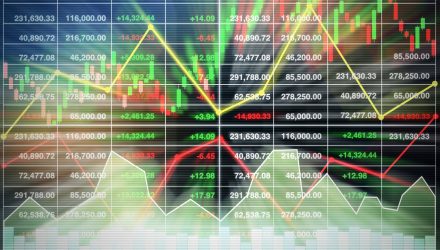Financial sector exchange-traded funds (ETFs) reacted to the mixed earnings results of Goldman Sachs and Citigroup, which reported first-quarter earnings on Monday.
The Financial Select Sector SPDR Fund (NYSEArca: XLF) was little changed, falling 0.52 percent while for traders, the Direxion Daily Financial Bull 3X ETF (NYSEArca: FAS) was down 1.47 percent on the added leverage as of 11:15 a.m. ET.
Goldman Sachs reported that revenue fell 13 percent to $8.81 billion, which came below analyst’s $8.9 billion estimate. Furthermore, the firm generated $2.25 billion of profit in the period or $5.71 a share, which exceeded the $4.89 estimate.
“We are pleased with our performance in the first quarter, especially in the context of a muted start to the year,” Goldman CEO David Solomon said in the release. “Our core businesses generated solid results driven by our strong franchise positions. We are focused on new opportunities to grow and diversify our business mix and serve a broader range of clients globally.”
Meanwhile, Citigroup bested first-quarter estimates, reporting earnings of $1.87 per share on $18.58 billion in revenue. Wall Street wsa expecting Citi to report earnings of $1.80 per share on $18.63 billion in revenue.
“Our earnings reflect the progress we are making to improve our return on and return of capital. Both our consumer and institutional businesses performed well and we saw good momentum in those areas where we have been investing,” CEO Michael Corbat said in a statement.
Related: Valuation On The Dark Side And First Steps On Pricing
Government Grilling
CEOs of big banks faced the music of Capitol Hill last week with a grilling from the House Financial Services committee.. All the government finger-wagging came as a precursor to banks’ first-quarter earnings, which kicked off last Friday.
On the Capitol Hill hot seat was:
- Jamie Dimon of JPMorgan Chase
- Bank of America’s Brian Moynihan
- David Solomon of Goldman Sachs
- Michael Corbat of Citigroup
- Morgan Stanley’s James Gorman
- State Street’s Ronald O’Hanley
- Charles Scharf of Bank of New York Mellon
The CEOs faced a battery of questions regarding executive compensation, income inequality and the overall stability of the nation’s banking system. It all ties back to the financial crisis over a decade ago–a simple matter of “checking in.”
“Ten years ago, the CEOs appeared before this very committee to discuss the financial crisis and the massive bailout taxpayers provided,” said House Financial Services committee and Democrat Maxine Waters. “A decade later, what have they learned? Are they helping their customers and working to benefit the communities they serve? Or are the practices of these banks still causing harm?”
XLF recently crossed its 200-day moving average last week with the strength in earnings from J.P. Morgan despite Wall Street analysts are already expecting a less-than-stellar earnings season for the first quarter. Investors are looking at a 4.3 percent year-over-year reduction in earnings growth, according to FactSet estimates.
Should those estimates hold up, it would represent the first profit reduction for the S&P 500 since the second quarter of 2016. With analysts expecting a decline in earnings, the focus falls on corporate guidance for the rest of the year, which could help temper any investor fears.
For more market trends, visit ETF Trends.








